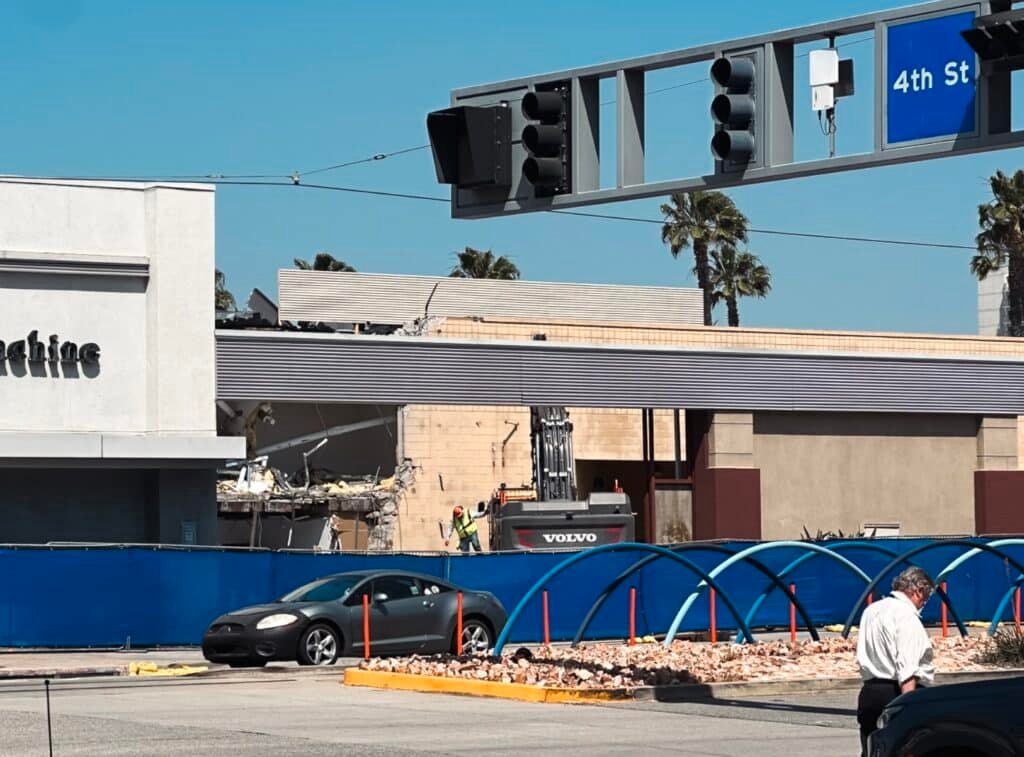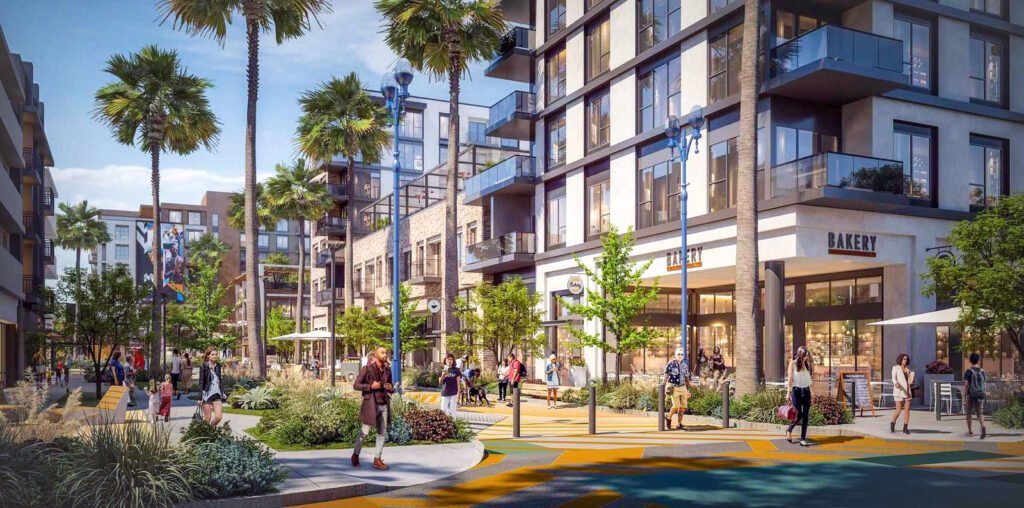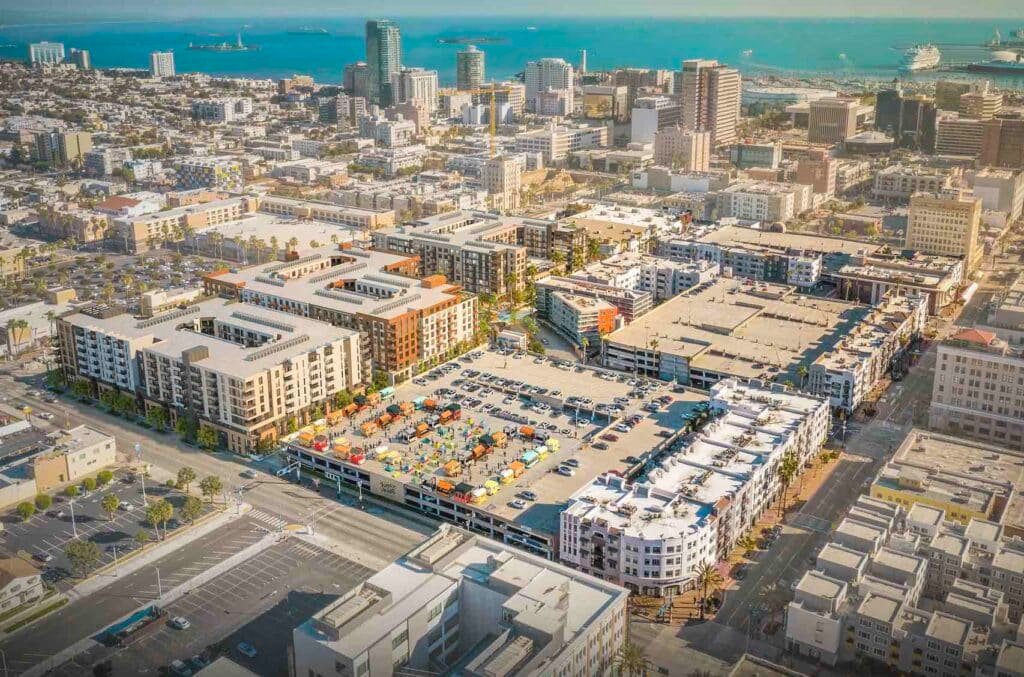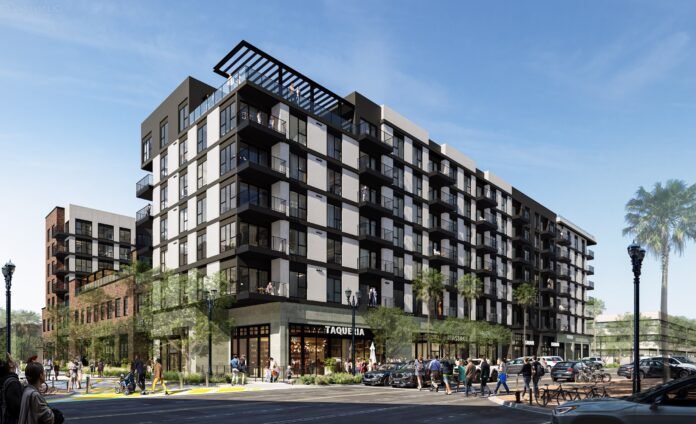It is now called Portico—formerly dubbed the Jefferson—in Downtown Long Beach. And, following the securing of a $150M loan in November of last year, Dallas- and SoCal-based JPI said it will break ground on its project this month. The 272-unit residential building is part of a larger, three-parcel development in what was once known as City Place.
“This eight-story project will bring 272 new homes to the area and feature an impressive array of amenities,” said Nicolas Toffoli, manager of land acquisition for the west region of JPI’s operation. “Coworking space. An expansive rooftop deck. Sauna. Large fitness center with a golf simulator. And a speakeasy-style lounge. Designed as a true mixed-use development, Portico will offer residents a highly walkable, connected lifestyle near transit, dining, and entertainment.”
Crews began demolishing the existing structures along the west side of Long Beach Boulevard between 4th and 5th Streets back in April to make way for the upcoming 272-unit residential building. Mosaic sold one of its parcels slated for residential development to JPI in May 2024. The retail-meets-soon-to-come-residential complex in Downtown Long Beach sits between 3rd and 6th Streets and Long Beach Boulevard and Pine Avenue. The Dallas- and SoCal-focused JPI has over 380 community developments under its belt.

What is the Portico development in Long Beach?
JPI has dubbed their portion of the Mosaic project as Portico, previously known as the Jefferson development.
It will be constructed on the land parcel bound by four sides: Long Beach Boulevard to the east. 4th Street to the south. The Promenade North to the west. And 5th Street to the north. JPI closed escrow last year with Mosaic for the 1.58-acre parcel. They will move forward with already-entitled plans. That means constructing 272 units of Class A for-rent apartments, including 16 affordable units, and 19,000 square feet of ground floor commercial space.
“We are excited to embark on this journey with the Long Beach community,” said Omar Rawi, Senior Vice President, Western Development at JPI. “Jefferson Long Beach represents our commitment to delivering high-quality apartment homes. And that means meeting the evolving needs of residents while enhancing the fabric of the neighborhoods in which we build.”

How will it affect Mosaic?
The 14-acre Mosaic complex is made up of three land parcels. And two of those are entitled for 900 units of housing, including 54 affordable units. The retail portion, including the former Walmart, will not be touched for now. It consists of the northern edge of 3rd Street: Ammatoli, Broken Spirits Distillery, and the in-flux Toma space. Additionally, there is the retail along 4th Street and on Pine Avenue.
“The parcel between 4th Street and 5th Street where the former Big 5 Sporting Goods? That is what we sold last year to JPI. They have such a reputable brand on their own and they’re looking forward to getting into Long Beach,” said Michael Gazzano earlier this year. He is a Managing Director of West Coast Investments for Turnbridge Equities, which is part of a triad of firms that operate and own Mosaic. “‘Parcel C,’ which is the former Walmart, is a property we will be keeping as well as the retail portion of Mosaic.”
Joining Turbridge as the operators and owners of Mosaic are Waterford Property Company and Monument Square Investment Group, all of which have decided to retain Parcel C to develop some 628 units, 38 of which will be affordable, along with 150,000 square feet of retail space.

Why Portico is an essential cog for Mosaic’s retail spaces
With the nearby Inkwell development—which officially opened last year—and the previously completed Aster and Onni East Village developments, Downtown Long Beach will likely see activation it hasn’t witnessed since pre-pandemic times.
This includes not just the new tenants moving into Mosaic, but a likely growing list of events and businesses on other properties. There’s the (rightfully) popular Sonoratown, Midnight Oil, and much-welcomed Buen Provecho—which reactivated a space that was dead for years—across the way, which are the neighborhood’s most recent additions. Art-centric events and DTLB bar crawls. Night markets and design festivals. This particular area of DTLB is ripe with cultural potential.
“With the completion of this parcel sale, our team’s immediate focus remains on elevating the mix of retail and restaurant options creating a true food destination for the city,” said Sean Rawson, co-founder Waterford, earlier this year. “And the fact that more residents will be in the area is only beneficial to our existing tenants.”
This article was originally published on May 8, 2024. It has since been updated.


